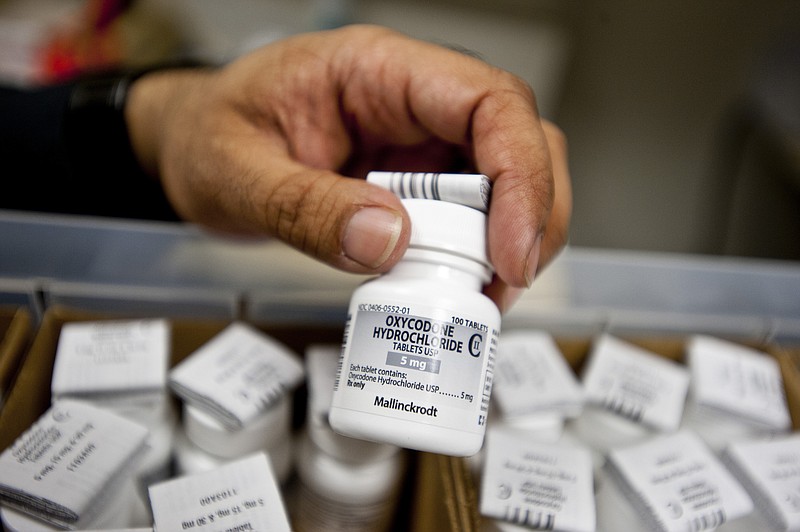"Tennessee is among the hardest-hit states when it comes to the opioid epidemic."
That's the first sentence of a state website dedicated to helping Tennesseans understand the enormity of the opioid epidemic here.
In 2017 - two years ago - 1,268 people died from opioid overdose deaths in Tennessee. The opioid-involved overdose deaths per 100,000 persons was 19.3.
And no wonder: The prescription rate per 100 persons was 94.4 - the third highest in the country and 1.5 times greater than the U.S. average.
Yes, that means more that 94 out of 100 people in Tennessee had an opioid prescription written for them in 2017. And despite increasing news stories and opioid education efforts, more than 6 million prescriptions were written the following year - 2018. Tennessee's population is only 6.54 million people - and about 22 percent of those people are children under 18.
On Tuesday, the Times Free Press ran a Page 1 story from the Tennessean about how one pharmacy in Murfreesboro earned the title of the state's largest opioids purchaser - buying 45.9 million pills for repackaging and dispensing from 2006 to 2012, according to a database maintained by the Drug Enforcement Administration. The database tracks the path of every single pain pill sold in the United States - by manufacturers and distributors to pharmacies in every town and city.
The Washington Post gained access to the DEA database as the result of a court order. The Post and HD Media, which publishes the Charleston Gazette-Mail in West Virginia, waged a year-long legal battle for access to the database, which the government and the drug industry had sought to keep secret.
And, again, no wonder: Our government has a love/hate relationship with Big Pharma, which in 2018 spent $281.4 million on lobbying and $27.5 million on campaigns.
You may recall the Washington Post and "60 minutes" special report in 2017 about then-Tennessee Rep. Marsha Blackburn (now Sen. Blackburn), who in Congress successfully pushed a bill making it harder for the U.S. Drug Enforcement Administration to investigate suspicious opioid shipments from major U.S. pharmaceutical companies - some of the same companies that contributed hundreds of thousands to her campaigns.
In recent days, a federal judge's ruling that opioid manufacturer Johnson & Johnson needs to pay Oklahoma for its role in the opioid crisis (many more states have sued, too) has other companies like Purdue Pharma talking settlements.
Nationwide, almost 218,000 Americans died from overdoses related to prescription opioids from 1999 to 2017. And for every one of the country's on-average 130 deaths a day from opioid overdose, 62 more people in 2015 had a substance use disorder involving a prescription and 377 had misused prescription opioids in the past year, according to the Centers for Disease Control and Prevention. For every one opioid prescription death, nearly 3,000 people in 2015 had used opioids in the past year.
The Murfreesboro pharmacy, then called Reeves-Sain Extended Care and now repurposed into another kind of drug supplier known as TwelveStone Health Partners, was and is a family business of Shane Reeves, who like his father who founded the company, also went into politics. In 2018 he successfully ran for state Senate, and while campaigning, advocated for solutions to the opioid crisis saying he believed the public should have limited access to pain pills, according to the Tennessean.
During this year's legislative session he sponsored a bill to ease some of Tennessee's recent prescription opioid limits, which were some of the strictest in the nation. Generally, a provider in Tennessee can't prescribe more than a three-day supply, except under limited circumstances. Reeves' bill expanded those circumstances and increased the amount that could be dispensed.
Reeves declined to be interviewed by the Tennessean, but the lawmaker, in an email, said the Tennessee Pharmacist Association and Tennessee Medical Association brought him the bill to "address some unintended consequences that patients (i.e. post-surgical, end of life) were experiencing as a result of the Tennessee Together bill that passed in 2018."
Most of Reeves' purchases came from another family business - that of his father. Two days before the Tennessean story was published, Reeves contested the DEA data, claiming the numbers of pills purchased for repackaging to nursing homes and hospice patients were reported incorrectly to the DEA.
The Tennessean wrote: "The dispute adds to a growing list of questions the owners have not answered since the data was released. How many pills were delivered to individual patients' homes instead of nursing facilities with strict safeguards? Why did the pharmacy have a large spike in opioid purchases in 2009? If the data was reported incorrectly, who made the mistake? Even if the company supplied every single nursing home and hospice patient in the Southern U.S., the Murfreesboro pharmacy, based on the DEA data, would have outnumbered patients with opioid pills by about 13 to 1."
About 1 million patients a year enter hospice or nursing home facilities in 16 Southern states, according to the Centers for Disease Control and Prevention. At its peak, Reeves-Sain Extended Care purchased 13.6 million pills a year, during a 36-month stretch between December 2008 and December 2011, the DEA data shows.
Certainly terminally ill and critically ill patients need pain relief, but our lawmakers - nationally, as well as in Tennessee - must say no to drug lobbyists and conflicted colleagues.
